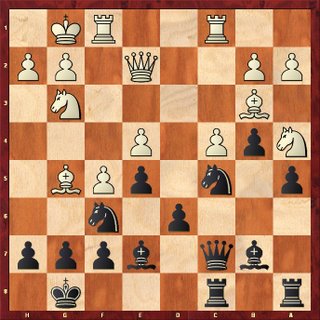Counting and quiescience: woe is me
One of my biggest problems involves counting and quiescience (they usually go together). I end up being lazy, not thinking through natural sequences of captures or (especially) considering good moves that don't seem 'natural'. Often, if there are multiple options I am very inefficient, switching back and forth in my mind in my analysis of different lines. Kotov, in Think like a grandmaster has a funny description of how efficient my thought process sometimes is:
Here is a nice little problem that I consider a fairly nasty test of counting/quiescience skills. Should black capture on e4. If so, with which piece?

I took this from a game between Anand-Ivanchuck at the Linares tournament in 1991. I stole it from McDonald's excellent book Chess: The art of logical thinking.
What is the best way to improve at these types of problems? Are there any puzzle books or software that focus on them?
Let us suppose that at one point in your game you have a choice between two moves, Rd1 or Ng5. Which should you play? You settle down comfortably in your chair and start your analysis by silently saying to yourself the possible moves. "All right, I could play Rd1 and he would probably play ...Bb7, or he could take my a-pawn, which is now undefended. What then? Do I like the look of the position then?" You go one move further in your analysis and then you pull a long face - the rook move no longer appeals to you. Then you look at the knight move. "What if I go Ng5? He can drive it away by ...h6, I go Ne4, he captures it with his bishop. I recapture and he attacks my queen with his rook. That doesn't look very nice...so the knight move is no good. Let's look at the rook move again. If he plays ...Bb7 I can reply f3, but what if he captures my a-pawn. What can I play then? No, the rook move is no good. I must check the knight move again. So, Ng5, h6, Ne4, Bxe4, Qxe4, Rd4. No good! So I mustn't move the knight. Try the rook move again. Rd1, Qxa2." At this point you glance at the clock. "My goodness! Already 30 minutes gone on thinking whether to move the rook or the knight." If it goes on like this you'll really be in time trouble. And then suddenly you are struck by the happy idea - why move rook or knight? "What about Bb1?" And without any more ado, without any analysis at all you move the bishop, just like that, with hardly any consideration at all.
Here is a nice little problem that I consider a fairly nasty test of counting/quiescience skills. Should black capture on e4. If so, with which piece?

I took this from a game between Anand-Ivanchuck at the Linares tournament in 1991. I stole it from McDonald's excellent book Chess: The art of logical thinking.
What is the best way to improve at these types of problems? Are there any puzzle books or software that focus on them?


7 Comments:
This is a difficult problem indeed. Because there are a lot of things going on in the position, you get a Short Term Memory overload. To solve these kind of problems easy, you have to enlighten the burden of your STM by joining the great amount of loose pieces into a lesser amount of significant chunks. Thats why I concentrate on simple positions first. "Chunkbuilding (TM)" :)
Tempo: in general, counting problems are very simple and relatively easy. They are of the "if I go here, and he goes there" variety, and all of the moves are fairly forced, and you just have to keep track of how much material is exchanged and the final position. They are great exercises in building calculation muscle, as they force you to visualize game trees.
The example I gave is very hard, though, because there is no obvious right answer (even to Fritz): I think two of the three captures are fine, as is h6, which is what was played.
So Blue, what version of Fritz are you running? I analyzed the position using Fritz 9 engine (too lazy to figure it out myself at the time) and it didn't have a difficult time finding 1...Qc6. A very logical and good move when you look at it. You're not only adding more pressure on White's e4 pawn, you're also double attacking White's Knight on a4. Next time i'll try to figure it out myself ;-)
Dutchdefence: there are lots of reasonable moves for black. Only one of them is a capture. ONe thing is, in a real game, it wouldn't be smart to spend TOO much time on this position as there are so many reasonable options. But I guess you have to sometimes analyze to realize this. If it were a bishop rather than a pawn on e4, the position would be more forcing.
I found the Dan H Novice Nook primer on counting to be helpful.
Tak: yes it is a good word article, but I would like tons of puzzles. I have another post coming up soon on counting.
the tricky stuff is not so much counting, but zwischenzugs (in-between moves)... a forcing move in the middle of mass exchanges interrupts the whole thing.
Post a Comment
<< Home